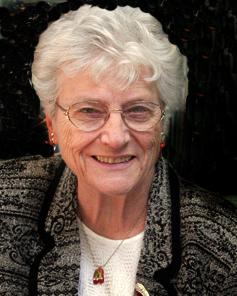
This is the fifth and last in a series about a 1926 Pioneer Girls reunion that appeared in the Rock County Herald on July 9, 1926. At the meeting, Effie Grout-Lindsey pays tribute to the mothers and wives of early day settlers.
LUVERNE PIONEER GIRLS HOLD ANNUAL RE-UNION
Effie Grout-Lindsey Pays Tribute to the Mothers and Wives of Early Day Settlers.
… And such was life in those far away days! Difficult, exacting and filled with deprivations and discomforts. There were few pleasures and still fewer privileges. But through the years of my childhood and girlhood I do not recall that my mother or any of her friends ever complained or referred to other days as happier or more comfortable. Each day was a new beginning. Each day’s task was met with a cheerful assumption of responsibility and determination to make that undertaking a success.
In the period when grasshopper raids were most frequent and their devastations most frightful, when hope for the future seemed at an end, my father came in one day and said to my mother, “It looks as if you would have to get out your washboard and tub and support the family.” Her spirited reply was characteristic: “Well, if it comes to that, I guess we can do it as well as anybody!” It is perhaps needless to add that she was not called upon to prove her words.
But what was it that drew these women into the wilderness and held them steady through years of discouragement and danger and difficulty? Why did they not resort to tears, as they are popularly supposed to do, and entreaties to persuade their husbands to return to the old home? Many of them did, but it is not of such that we are speaking. This is the story of the ones who stayed!
It was the spirit of youth, the lure of adventure that called them into new and untried paths.
In their dreams they saw broad acres of well tilled fields, crowned with beautiful homes, their homes. They saw better opportunities and wider contacts for their children, and comfort and even luxury for their own old age. And when the everyday difficulties and discouragements of the new land — stern reality — took the place of dreams, what kept them patient in the midst of suffering; cheerful and loving in disappointment; gentle and hopeful in poverty? It was their three-fold faith — faith, first, in the future of their adopted home. Faith that an end would surely come to drouth and prairie fire and blizzards and grasshoppers, and that eventually the marvelous fertility of the soil would produce crops that would repay all their losses.
Faith, in the second place, in the sterling integrity, the moral courage and the physical stamina of the pioneer men, for love of whom they had been willing to forsake home and friends and ease and comfort.
And, lastly, triumphant faith in God, at once their heritage and their experience, which bred in them the high courage, the self-forgetfulness and the perseverance that made them what they were — the nourishing mothers of a new civilization.



